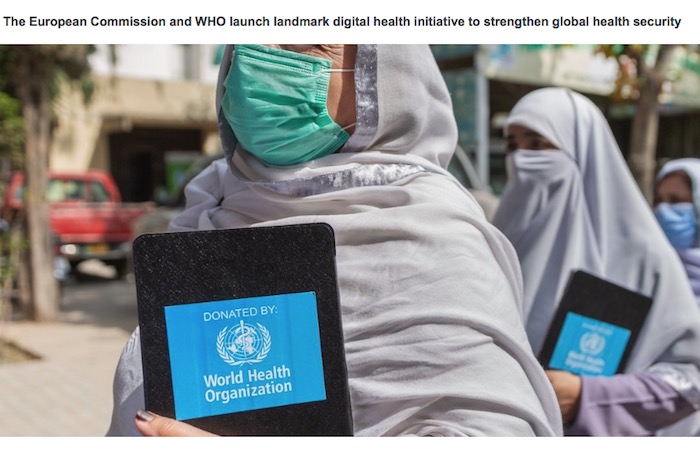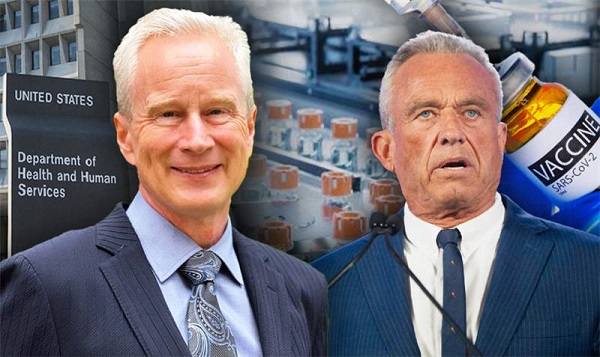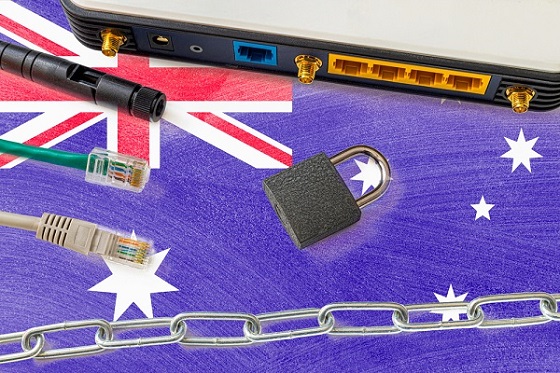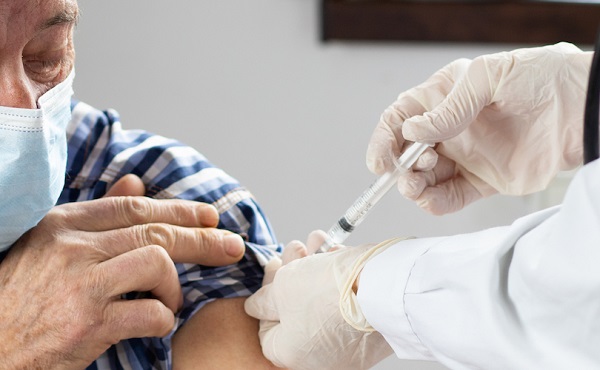Health
WHO’s Global Digital Health Certification Network

With notes from the World Health Organization website, Dr. John Campbell explains the WHO’s Global Digital Health Certification Network. To see the WHO’s press release click here or scroll below the video where it is attached.
From the youtube channel of  Dr. John Campbell
Dr. John Campbell
Press release from the World Health Organization
The European Commission and WHO launch landmark digital health initiative to strengthen global health security
The World Health Organization (WHO) and European Commission have announced today the launch of a landmark digital health partnership.
In June 2023, WHO will take up the European Union (EU) system of digital COVID-19 certification to establish a global system that will help facilitate global mobility and protect citizens across the world from on-going and future health threats, including pandemics. This is the first building block of the WHO Global Digital Health Certification Network (GDHCN) that will develop a wide range of digital products to deliver better health for all.
“Building on the EU’s highly successful digital certification network, WHO aims to offer all WHO Member States access to an open-source digital health tool, which is based on the principles of equity, innovation, transparency and data protection and privacy,” said Dr Tedros Adhanom Ghebreyesus, WHO Director-General. “New digital health products in development aim to help people everywhere receive quality health services quickly and more effectively”.
Based on the EU Global Health Strategy and WHO Global strategy on digital health, the initiative follows the 30 November 2022 agreement between Commissioner Kyriakides and Dr Tedros to enhance strategic cooperation on global health issues. This further bolsters a robust multilateral system with WHO at its core, powered by a strong EU.
“This partnership is an important step for the digital action plan of the EU Global Health Strategy. By using European best practices we contribute to digital health standards and interoperability globally—to the benefit of those most in need. It is also a powerful example of how alignment between the EU and the WHO can deliver better health for all, in the EU and across the world. As the directing and coordinating authority on international health work, there is no better partner than the WHO to advance the work we started at the EU and further develop global digital health solutions,” said Stella Kyriakides, Commissioner for Health and Food Safety.
This partnership will include close collaboration in the development, management and implementation of the WHO GDHCN system, benefitting from the European Commission’s ample technical expertise in the field. A first step is to ensure that the current EU digital certificates continue to function effectively.
“With 80 countries and territories connected to the EU Digital COVID-19 Certificate, the EU has set a global standard. The EU certificate has not only been an important tool in our fight against the pandemic, but has also facilitated international travel and tourism. I am pleased that the WHO will build on the privacy-preserving principles and cutting-edge technology of the EU certificate to create a global tool against future pandemics,” added Thierry Breton, Commissioner for Internal Market.
A global WHO system building on EU legacy
One of the key elements in the European Union’s work against the COVID-19 pandemic has been digital COVID-19 certificates. To facilitate free movement within its borders, the EU swiftly established interoperable COVID-19 certificates (entitled ‘EU Digital COVID-19 Certificate’ or ‘EU DCC’). Based on open-source technologies and standards it allowed also for the connection of non-EU countries that issue certificates according to EU DCC specifications, becoming the most widely used solution around the world.
From the onset of the pandemic, WHO engaged with all WHO Regions to define overall guidelines for such certificates. To help strengthen global health preparedness in the face of growing health threats, WHO is establishing a global digital health certification network which builds upon the solid foundations of the EU DCC framework, principles and open technologies. With this collaboration, WHO will facilitate this process globally under its own structure with the aim to allow the world to benefit from convergence of digital certificates. This includes standard-setting and validation of digital signatures to prevent fraud. In doing so, WHO will not have access to any underlying personal data, which would continue to be the exclusive domain of governments.
The first building block of the global WHO system becomes operational in June 2023 and aims to be progressively developed in the coming months.
A long-term digital partnership to deliver better health for all
To facilitate the uptake of the EU DCC by WHO and contribute to its operation and further development, WHO and the European Commission have agreed to partner in digital health.
This partnership will work to technically develop the WHO system with a staged approach to cover additional use cases, which may include, for example, the digitisation of the International Certificate of Vaccination or Prophylaxis. Expanding such digital solutions will be essential to deliver better health for citizens across the globe.
This cooperation is based on the shared values and principles of transparency and openness, inclusiveness, accountability, data protection and privacy, security, scalability at a global level, and equity. The WHO and the European Commission will work together to encourage maximum global uptake and participation. Particular attention will be paid to equitable opportunities for the participation by those most in need: low and middle-income countries.
Dr. John Campbell’s Presentation notes:
WHO’s Global Digital Health Certification Network https://www.who.int/initiatives/globa…
WHO has established the Global Digital Health Certification Network (GDHCN). Open-source platform, built on robust & transparent standards, that establishes the first building block of digital public health infrastructure, for developing a wide range of digital products, for strengthening pandemic preparedness
Background Member States used digital COVID-19 test and vaccine certificates As the directing and coordinating authority on international health work, at the onset of the pandemic, WHO engaged with all WHO Regions to define overall guidance for such certificates and published the Digital Documentation of COVID-19 Certificates
https://www.who.int/publications/i/it… https://www.who.int/publications/i/it… there is a recognition of an existing gap, and continued need for a global mechanism, that can support bilateral verification of the provenance of health documents
The GDHCN may include Digitisation of the International Certificate of Vaccination or Prophylaxis, verification of prescriptions across borders
International Patient Summary Verification of vaccination certificates within and across borders Certification of public health professionals (through WHO Academy) Expanding such digital solutions will be essential to deliver better health for people across the globe.
The GDHCN has been designed to be interoperable with other existing regional networks EU-WHO digital partnership https://www.who.int/news/item/05-06-2… ![]() • LIVE: WHO and @EU… https://commission.europa.eu/strategy… WHO and the European Commission have agreed to partner in digital health.
• LIVE: WHO and @EU… https://commission.europa.eu/strategy… WHO and the European Commission have agreed to partner in digital health.
This partnership will work to technically develop the WHO system with a staged approach to cover additional use cases, In June 2023, WHO will take up the European Union (EU) system of digital COVID-19 certification to establish a global system, that will help facilitate global mobility
This is the first building block of the WHO Global Digital Health Certification Network (GDHCN)
Dr Tedros Adhanom Ghebreyesus WHO aims to offer all WHO Member States access, On the principles of equity, innovation, transparency and data protection and privacy Stella Kyriakides, Commissioner for Health and Food Safety
This partnership is an important step for the digital action plan of the EU Global Health Strategy, we contribute to digital health standards and interoperability globally
Thierry Breton, Commissioner for Internal Market The EU certificate … has also facilitated international travel and tourism I am pleased that the WHO will build on …. cutting-edge technology … to create a global tool against future pandemics
One of the key elements in the European Union’s work against the COVID-19 pandemic has been digital COVID-19 certificates. WHO will facilitate this process globally under its own structure … allow the world to benefit from convergence of digital certificates. Expanding such digital solutions will be essential to deliver better health for citizens across the globe.
The WHO and the European Commission will work together to encourage maximum global uptake and participation.
Alberta
Early Success: 33 Nurse Practitioners already working independently across Alberta

Nurse practitioners expand primary care access |
The Alberta government’s Nurse Practitioner Primary Care program is showing early signs of success, with 33 nurse practitioners already practising independently in communities across the province.
Alberta’s government is committed to strengthening Alberta’s primary health care system, recognizing that innovative approaches are essential to improving access. To further this commitment, the Nurse Practitioner Primary Care Program was launched in April, allowing nurse practitioners to practise comprehensive patient care autonomously, either by operating their own practices or working independently within existing primary care settings.
Since being announced, the program has garnered a promising response. A total of 67 applications have been submitted, with 56 approved. Of those, 33 nurse practitioners are now practising autonomously in communities throughout Alberta, including in rural locations such as Beaverlodge, Coaldale, Cold Lake, Consort, Morley, Picture Butte, Three Hills, Two Hills, Vegreville and Vermilion.
“I am thrilled about the interest in this program, as nurse practitioners are a key part of the solution to provide Albertans with greater access to the primary health care services they need.”
To participate in the program, nurse practitioners are required to commit to providing a set number of hours of medically necessary primary care services, maintain a panel size of at least 900 patients, offer after-hours access on weekends, evenings or holidays, and accept walk-in appointments until a panel size reaches 900 patients.
With 33 nurse practitioners practising independently, about 30,000 more Albertans will have access to the primary health care they need. Once the remaining 23 approved applicants begin practising, primary health care access will expand to almost 21,000 more Albertans.
“Enabling nurse practitioners to practise independently is great news for rural Alberta. This is one more way our government is ensuring communities will have access to the care they need, closer to home.”
“Nurse practitioners are highly skilled health care professionals and an invaluable part of our health care system. The Nurse Practitioner Primary Care Program is the right step to ensuring all Albertans can receive care where and when they need it.”
“The NPAA wishes to thank the Alberta government for recognizing the vital role NPs play in the health care system. Nurse practitioners have long advocated to operate their own practices and are ready to meet the growing health care needs of Albertans. This initiative will ensure that more people receive the timely and comprehensive care they deserve.”
The Nurse Practitioner Primary Care program not only expands access to primary care services across the province but also enables nurse practitioners to practise to their full scope, providing another vital access point for Albertans to receive timely, high-quality care when and where they need it most.
Quick facts
- Through the Nurse Practitioner Primary Care Program, nurse practitioners receive about 80 per cent of the compensation that fee-for-service family physicians earn for providing comprehensive primary care.
- Compensation for nurse practitioners is determined based on panel size (the number of patients under their care) and the number of patient care hours provided.
- Nurse practitioners have completed graduate studies and are regulated by the College of Registered Nurses of Alberta.
- For the second consecutive year, a record number of registrants renewed their permits with the College of Registered Nurses of Alberta (CRNA) to continue practising nursing in Alberta.
- There were more than 44,798 registrants and a 15 per cent increase in nurse practitioners.
- Data from the Nurse Practitioner Primary Care Program show:
- Nine applicants plan to work on First Nations reserves or Metis Settlements.
- Parts of the province where nurse practitioners are practising: Calgary (12), Edmonton (five), central (six), north (three) and south (seven).
- Participating nurse practitioners who practise in eligible communities for the Rural, Remote and Northern Program will be provided funding as an incentive to practise in rural or remote areas.
- Participating nurse practitioners are also eligible for the Panel Management Support Program, which helps offset costs for physicians and nurse practitioners to provide comprehensive care as their patient panels grow.
Related information
Addictions
BC Addictions Expert Questions Ties Between Safer Supply Advocates and For-Profit Companies

By Liam Hunt
Canada’s safer supply programs are “selling people down the river,” says a leading medical expert in British Columbia. Dr. Julian Somers, director of the Centre for Applied Research in Mental Health and Addiction at Simon Fraser University, says that despite the thin evidence in support of these experimental programs, the BC government has aggressively expanded them—and retaliated against dissenting researchers.
Somers also, controversially, raises questions about doctors and former health officials who appear to have gravitated toward businesses involved in these programs. He notes that these connections warrant closer scrutiny to ensure public policies remain free from undue industry influence.
Safer supply programs claim to reduce overdoses and deaths by distributing free addictive drugs—typically 8-milligram tablets of hydromorphone, an opioid as potent as heroin—to dissuade addicts from accessing riskier street substances. Yet, a growing number of doctors say these programs are deeply misguided—and widely defrauded.
Ultimately, Somers argues, safer supply is exacerbating the country’s addiction crisis.
Somers opposed safer supply at its inception and openly criticized its nationwide expansion in 2020. He believes these programs perpetuate drug use and societal disconnection and fail to encourage users to make the mental and social changes needed to beat addiction. Worse yet, the safer supply movement seems rife with double standards that devalue the lives of poorer drug users. While working professionals are provided generous supports that prioritize recovery, disadvantaged Canadians are given “ineffective yet profitable” interventions, such as safer supply, that “convey no expectation that stopping substance use or overcoming addiction is a desirable or important goal.”
To better understand addiction, Somers created the Inter-Ministry Evaluation Database (IMED) in 2004, which, for the first time in BC’s history, connected disparate information—i.e. hospitalizations, incarceration rates—about vulnerable populations.
Throughout its existence, health experts used IMED’s data to create dozens of research projects and papers. It allowed Somers to conduct a multi-million-dollar randomized control trial (the “Vancouver at Home” study) that showed that scattering vulnerable people into regular apartments throughout the city, rather than warehousing them in a few buildings, leads to better outcomes at no additional cost.
In early 2021, Somers presented recommendations drawn from his analysis of the IMED to several leading officials in the B.C. government. He says that these officials gave a frosty reception to his ideas, which prioritized employment, rehabilitation, and social integration over easy access to drugs. Shortly afterwards, the government ordered him to immediately and permanently delete the IMED’s ministerial data.
Somers describes the order as a “devastating act of retaliation” and says that losing access to the IMED effectively ended his career as a researcher. “My lab can no longer do the research we were doing,” he noted, adding that public funding now goes exclusively toward projects sympathetic to safer supply. The B.C. government has since denied that its order was politically motivated.
In early 2022, the government of Alberta commissioned a team of researchers, led by Somers, to investigate the evidence base behind safer supply. They found that there was no empirical proof that the experiment works, and that harm reduction researchers often advocated for safer supply within their studies even if their data did not support such recommendations.
Somers says that, after these findings were published, his team was subjected to a smear campaign that was partially organized by the British Columbia Centre on Substance Use (BCCSU), a powerful pro-safer supply research organization with close ties to the B.C. government. The BCCSU has been instrumental in the expansion of safer supply and has produced studies and protocols in support of it, sometimes at the behest of the provincial government.
Somers is also concerned about the connections between some of safer supply’s key proponents and for-profit drug companies.
He notes that the BCCSU’s founding executive director, Dr. Evan Wood, became Chief Medical Officer at Numinus Wellness, a publicly traded psychedelic company, in 2020. Similarly, Dr. Perry Kendall, who also served as a BCCSU executive director, went on to found Fair Price Pharma, a now-defunct for-profit company that specializes in providing pharmaceutical heroin to high-risk drug users, the following year.
While these connections are not necessarily unethical, they do raise important questions about whether there is enough industry regulation to minimize potential conflicts of interest, whether they be real or perceived.
The BCCSU was also recently criticized in an editorial by Canadian Affairs, which noted that the organization had received funding from companies such as Shoppers Drug Mart and Tilray (a cannabis company). The editorial argued that influential addiction research organizations should not receive drug industry funding and reported that Alberta founded its own counterpart to the BCCSU in August, known as the Canadian Centre of Recovery Excellence, which is legally prohibited from accepting such sponsorships.
Already, private interests are betting on the likely expansion of safer supply programs. For instance, Safe Supply Streaming Co., a publicly traded venture capital firm, has advertised to potential investors that B.C.’s safer supply system could create a multi-billion-dollar annual market.
Somers believes that Canada needs more transparency regarding how for-profit companies may be directly or indirectly influencing policy makers: “We need to know exactly, to the dollar, how much of [harm reduction researchers’] operating budget is flowing from industry sources.”
Editor’s note: This story is published in syndication with Break The Needle and Western Standard.
The Bureau is a reader-supported publication. To receive new posts and support my work, consider becoming a free or paid subscriber.
Dr. Julian M. Somers is director of the Centre for Applied Research in Mental Health and Addiction at Simon Fraser University. He was Director of the UBC Psychology Clinic, and past president of the BC Psychological Association. Liam Hunt is a contributing author to the Centre For Responsible Drug Policy in partnership with the Macdonald-Laurier Institute.
-

 Brownstone Institute1 day ago
Brownstone Institute1 day agoThe Most Devastating Report So Far
-

 Business1 day ago
Business1 day agoCarbon tax bureaucracy costs taxpayers $800 million
-

 ESG1 day ago
ESG1 day agoCan’t afford Rent? Groceries for your kids? Trudeau says suck it up and pay the tax!
-

 Daily Caller1 day ago
Daily Caller1 day agoLos Angeles Passes ‘Sanctuary City’ Ordinance In Wake Of Trump’s Deportation Plan
-

 John Stossel1 day ago
John Stossel1 day agoGreen Energy Needs Minerals, Yet America Blocks New Mines
-

 COVID-192 days ago
COVID-192 days agoDr. McCullough praises RFK Jr., urges him to pull COVID shots from the market
-

 MAiD2 days ago
MAiD2 days agoOver 40% of people euthanized in Ontario lived in poorest parts of the province: government data
-

 Alberta1 day ago
Alberta1 day agoProvince considering new Red Deer River reservoir east of Red Deer







